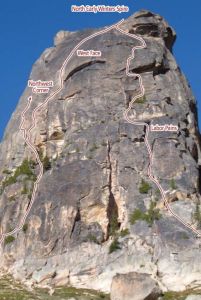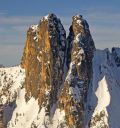Labor Pains, North Early Winters Spire III 5.11a |
||
Washington Pass, Washington, USA | ||
| ||
|
Avg time to climb route: 2.5-5 hours
Approach time: 1.5-3 hours Descent time: 1.5-3 hours Number of pitches: 6 Height of route: 600' Overview
Labor Pains is a slightly obscure, fun, and burly route. With mostly sound rock, it is a notch up in difficulty and commitment from the West Face. While the hardest moves on Labor Pains are not as hard as the most difficult sections of the Hitch Hiker, theyíre far more committing and the gear is trickier. The rock on the first crux on Pitch 2 is slightly grainy but never poor. The moves are consistently challenging and the protection is engaging. The upper pitches follow a mix of splitter cracks and face climbing on excellent rock. Its spectacular position only adds to the quality of this climb.
Climber Beta on Labor Pains
Find other routes like
Labor Pains
Route History
Husband and wife climbing partners Steve Risse and Donna McBain made the first ascent in September of 1988. Not much is know about their ascent. McBrain was an outstanding rock climber and was an early stalwart member of Women Climbers Northwest. She worked for quite a few years for the Trust For Public Land and was instrumental in the acquisition of Peshastin Pinnacles as a state park. Dr. Steve Risse from Seattle was famous for many first ascents in the area, including the notorious Tooth and Claw. Unfortunately, Risse perished along with his friends, Mark Bebie and Tom Waasdorp, while hit by an avalanche caused by falling ice on March 20, 1993, while attempting Slipstream on Snow Dome in the Canadian Rockies.Strategy
Crowds are unlikely even on a busy weekend. This route is certainly a step up in difficulty from the West Face with harder cruxes and climbing that is both more sustained and less straightforward. Labor Pains has some difficult, delicate, and technical sections, as well as some burly and thuggy sections. The hardest sections arenít necessarily runout, but you canít pull through most cruxes on gear. Climbers attempting this route should be solid at the grade.The route starts up the Chockstone Route, before going up and left trending toward a shallow right-facing corner that marks the start of Pitch 2. This pitch is sustained and pumpy mid-5.10 climbing with a handful of 5.11a moves thrown in near the top. Despite much the pitch climbing a thin crack, be sure to bring a 4Ē piece to the rack for this pitch; youíll be grateful. Getting solid gear on this pitch takes a little extra effort but the climbing is never scary. The 5.11 crux, pulling the roof, is well-protected and is followed by slightly runout, but never dangerous, 5.9 climbing. Pitch 3 is more moderate and ends at a splitter West Face-looking finger crack. Pitch 4 starts with a short 5.10d section that has a very similar feel to its neighbor around the corner, the West Face. It involves steep finger-sized jamming that is only very difficult for a body length or so. Once past the finger crack, the leader moves left under a small roof to a 5.11a mantle protected by a new bolt. Once past this small roof, the climbing is steep and sustained mid-5.10 face climbing on small-flakes and technical face protected by tiny gear and old pitons which ends at a two-bolt belay and a small stance. You can link Pitches 3 and 4 with a 60m rope if you mind your rope drag. Pitch 5 is the third 5.11a pitch, and while it has the shortest crux, itís likely the hardest on the route. The 5.11a mantel is stout and you should come prepared for strenuous mantels. Make sure your belayer is attentive. The leader has gear at their ankles but a sloping ledge not far below that. In 2006, a few guides from North Cascades Mountain Guides replaced two bolts on the route. In 2011, the ASCA replaced two more. There are a few cruxes on this pitch you canít pull on gear to get through. Retreat Storm
There are a few fixed anchors and trees to rappel from. From high on the route, you leave gear and have two 60m ropes. With full afternoon sun and good wind, this route dries fairly quickly after a storm but not as fast as the West Face.
Everything You Need to Know About
Washington Pass
Search the internet for beta on
Labor Pains
|
Other Routes on North Early Winters Spire
|




